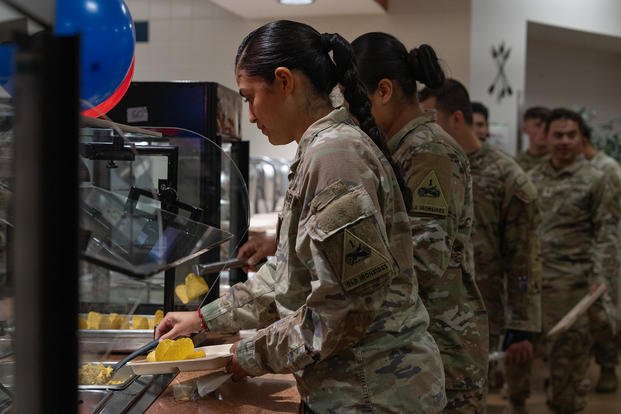The U.S. Army is undertaking a significant transformation of its dining services, considering a shift from government-operated facilities to privately managed ones. This initiative aims to modernize the Army’s food service but could also impose additional financial burdens on enlisted soldiers who already face low pay scales.
Dubbed “campus-style dining,” this proposal is presented as an incentive for private companies to enhance Army dining experiences, offering extended hours and diverse menu options. However, documents obtained by Military.com suggest that the plan may lack strict nutritional guidelines and financial oversight, potentially allowing vendors to promote high-cost items like alcohol to soldiers with limited alternatives.
Currently, the Army is yet to secure a contractor for this venture, with the deadline for proposals set for Tuesday.
“[We] will leverage industry expertise and incentivize a contractor to operate a facility where soldiers want to dine, with better ambience, additional healthy food options, extended operating hours, and more,” stated Lt. Gen. Chris Mohan, the acting head of Army Material Command, during a hearing on the Department of Defense’s food operations.
The pilot program will be implemented at five major Army bases: Fort Bragg in North Carolina, Fort Carson in Colorado, Fort Stewart in Georgia, Fort Drum in New York, and Fort Cavazos in Texas.
Under the new plan, contractors would manage dining facilities, handle renovation expenses, and have the liberty to sell premium food and beverages. Profits would be shared with the Army. The proposal allows for flexible vendor offerings, exempting them from adhering to Army nutritional standards, even though the Army itself often bypasses its own guidelines. Additionally, the Berry Amendment, which prioritizes U.S.-made products, would not apply, altering the procurement process.
For junior enlisted personnel residing in barracks, participation is non-negotiable. They are automatically charged a Basic Allowance for Subsistence (BAS) of approximately $460 monthly, deducted from their salaries. This deduction persists regardless of meal consumption, and the Army has struggled to account for these funds’ utilization.
In the revised system, deductions would remain, but soldiers might incur out-of-pocket expenses for items not included in the contracted meal package.
“It’s important to stress this is a pilot program; we’ll be assessing how this goes,” commented Col. Junel Jeffrey, a spokesperson for the service. “Regular dining facilities are not being replaced.”
The solicitation for contracts frequently highlights terms like “high-quality” and “fresh,” yet fails to define these criteria clearly.
Historically, the Defense Department has had mixed outcomes with privatizing major services, including healthcare, housing, and military relocations. Since the 1990s, private entities have been tasked with handling significant roles within the department, offering enhanced services and benefits.
Despite some successes, these privatization efforts have not been without controversy. In 2018, Reuters reported on substandard conditions in privatized military housing, including poor construction and maintenance, leading to health and safety issues for residents.
Recent changes in Tricare contractors have disrupted military families’ access to healthcare, with ongoing issues in securing appointments under the new network managed by TriWest Healthcare Alliance.
Moreover, last week, Defense Secretary Pete Hegseth terminated a $7.2 billion contract due to the inability of HomeSafe Alliance to fulfill its commitments for managing domestic military relocations.
Pentagon spokesman Sean Parnell stated that the contract was canceled “for cause due to HSA’s demonstrated inability to fulfill their obligations and deliver high-quality moves to service members.”











